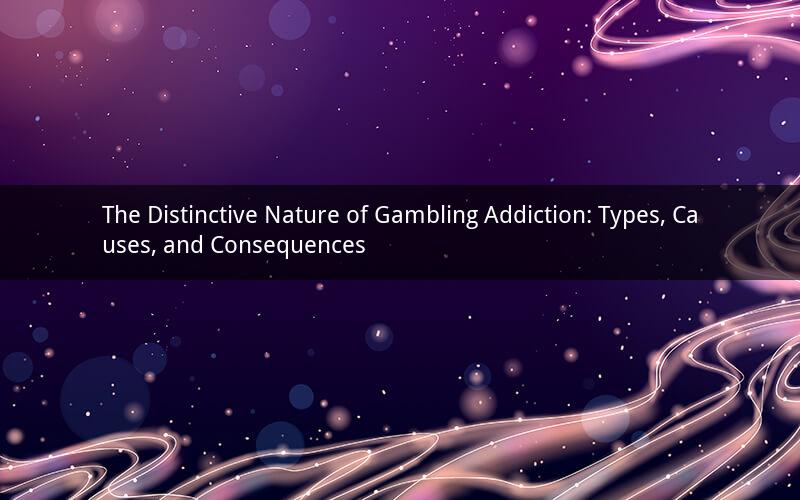
Introduction
Gambling addiction, also known as pathological gambling, has garnered considerable attention in recent years due to its growing prevalence. It is crucial to understand the distinctive nature of gambling addiction, including its types, causes, and consequences. This article delves into the various aspects of gambling addiction, providing a comprehensive overview of its characteristics and implications.
Types of Gambling Addiction
1. Pathological Gambling
Pathological gambling, often referred to as gambling addiction, is characterized by an uncontrollable urge to gamble, leading to significant distress and impairment in various aspects of life. It is classified as a mental health disorder in the Diagnostic and Statistical Manual of Mental Disorders (DSM-5).
2. Problematic Gambling
Problematic gambling refers to a milder form of gambling addiction where individuals may experience some negative consequences but have not reached the level of impairment associated with pathological gambling. This type of addiction often involves gambling to relieve stress, cope with emotions, or escape reality.
3. Social Gambling
Social gambling refers to the casual and recreational form of gambling that is not associated with any significant problems. It involves socializing and enjoying the activity without the potential for harm or addiction.
Causes of Gambling Addiction
1. Genetic Factors
Research indicates that genetics play a significant role in the development of gambling addiction. Individuals with a family history of addiction, particularly to substances like alcohol or drugs, may be more susceptible to developing gambling addiction.
2. Environmental Factors
Environmental factors, such as exposure to gambling opportunities, cultural influences, and the presence of role models, can contribute to the development of gambling addiction. The accessibility and normalization of gambling activities in society may increase the risk of addiction.
3. Psychological Factors
Individual psychological factors, such as impulsivity, sensation-seeking, and mood regulation issues, can also contribute to the development of gambling addiction. Individuals who struggle with managing their emotions or seek thrills and excitement may be more prone to developing gambling addiction.
Consequences of Gambling Addiction
1. Financial Consequences
Gambling addiction can lead to severe financial consequences, including significant debt, bankruptcy, and the loss of assets. Individuals with gambling addiction often struggle to maintain financial stability and may experience job loss or other financial difficulties.
2. Personal Relationships
Gambling addiction can strain personal relationships, including romantic relationships, friendships, and family bonds. Individuals with gambling addiction may lie, steal, or behave manipulatively to fund their gambling habits, leading to trust issues and emotional distress.
3. Mental Health Consequences
Gambling addiction can contribute to the development of various mental health disorders, such as depression, anxiety, and substance abuse. The stress and negative emotions associated with gambling addiction can exacerbate these conditions.
4. Legal Consequences
Individuals with gambling addiction may face legal consequences, including arrest for theft, fraud, or other crimes committed to fund their gambling habits. The addiction can lead to a downward spiral, with the individual engaging in increasingly risky behavior.
5. Physical Health Consequences
Gambling addiction can have adverse effects on physical health, including sleep disturbances, stress-related health issues, and a weakened immune system. The constant stress and anxiety associated with gambling addiction can take a toll on an individual's overall well-being.
Questions and Answers
1. Question: Can gambling addiction be treated effectively?
Answer: Yes, gambling addiction can be treated effectively. Various treatment approaches, including therapy, counseling, and support groups, can help individuals overcome their addiction and lead a healthier life.
2. Question: What are the signs of gambling addiction?
Answer: Signs of gambling addiction may include secretive behavior, borrowing money, lying about gambling activities, spending excessive amounts of time and money on gambling, and experiencing negative consequences as a result of gambling.
3. Question: Is gambling addiction a rare disorder?
Answer: Gambling addiction is not a rare disorder; it is estimated to affect millions of people worldwide. Its prevalence has been on the rise, particularly with the increase in online gambling opportunities.
4. Question: Can gambling addiction be prevented?
Answer: While gambling addiction cannot be completely prevented, certain measures can be taken to reduce the risk. These include avoiding risky behaviors, setting limits on gambling activities, and seeking support when faced with gambling-related issues.
5. Question: Can someone with a gambling addiction recover?
Answer: Yes, individuals with gambling addiction can recover and lead fulfilling lives. With the right support, treatment, and commitment, recovery is possible, and individuals can overcome their addiction and move forward towards a healthier future.